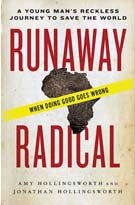What has brought healing this past year is finally finding a name for what I’d done, for what had been done to me, and for what I do now.
What I’d done is legalism, which is when you control yourself.
What was done to me is manipulation, which is when you control others.
What I do now is grace, which asks for no control.
 These texts were written by Jonathan Hollingsworth, a college student who takes a gap year to volunteer in Cameroon, in the aftermath of what turns into a devastating experience. Jonathan tells the story (with his mother, Amy Hollingsworth) of how his radical commitment to Christianity led him astray in Runaway Radical: When Doing Good Goes Wrong. In dozens of short, suspenseful chapters that jump back and forth in time, we learn how Jonathan became obsessed with changing the world after reading books by world-changing missionaries with big ideas. And then, how his mission ruined his life.
These texts were written by Jonathan Hollingsworth, a college student who takes a gap year to volunteer in Cameroon, in the aftermath of what turns into a devastating experience. Jonathan tells the story (with his mother, Amy Hollingsworth) of how his radical commitment to Christianity led him astray in Runaway Radical: When Doing Good Goes Wrong. In dozens of short, suspenseful chapters that jump back and forth in time, we learn how Jonathan became obsessed with changing the world after reading books by world-changing missionaries with big ideas. And then, how his mission ruined his life.
Jonathan’s faith and obsession motivated him to go to Cameroon, where he ended up with a corrupt organization whose leader and host father essentially convinced him to remain under house arrest overseas. When Jonathan got back to the US, his church convinced him to keep mum, despite his trauma and depression.
In the end (spoiler alert!), Jonathan regains his faith, albeit outside his home church. He decides that his “legalism” or obsessive commitment to changing the world was wrong, and says that “Jesus came into a system that was black and white and made it gray.” He questions his faith and learns to refuse to answer others’ questions about his beliefs. For him, what was once black and white—to be a Christian means to do as much good as you can for others—is now gray.
I was excited to read this book as part of Patheos’ Book Club this month; I love reading memoirs, and this one promised a decidedly different perspective. Although it was a spiritual memoir, it also spiraled around themes of young people’s hope, promise, and ambition. As a young person with a lot of hope and ambition myself, I was eager to see what went wrong in Jonathan’s mission.
And yet, I was disappointed. Although there were plenty of beautifully lyrical bright spots, especially when Jonathan began to recover some of his faith, much of the book was opaque. Details were vague; we learn that Jonathan grew up “privileged” but don’t know where his house is or what his parents do; we meet a few local homeless people, but don’t know what city they live in. We know Jonathan goes to church, but don’t learn its denomination, or even its size or style of worship. We know he got involved with a charity organization, but again, don’t learn its size or its mission.
The details of what happens to Jonathan overseas are understandably vague: essentially a prisoner in his host family’s home, Jonathan has blotted much of the experience out and deleted the blog posts he wrote while there. He also lost his laptop in a flood.
But this book claims to be about this experience. In the end, I am not even sure what his prison-guard-like host father looked or acted like. What did he say? What did his voice sound like? How did he prevent Jonathan from leaving the house?
Still, I loved reading Jonathan’s honest insights into the months after his overseas experience. In a chance meeting with a youth pastor, Jonathan tells the youth pastor that he needs to take a break from Christianity. The youth pastor is stricken. There is no room for a step back in this church. As Jonathan puts it, “When spiritual growth is measured in intensity, the only direction you’re permitted to go is off the deep end.”
I’ve never before read such honesty about faith struggles from someone who still considers himself a Christian. These stories, as Amy and Jonathan recognize, are not allowed.
Jonathan and Amy’s condemnation of “legalism” also forced me to think, though I wish the authors had explored this idea in more detail. Their definition of “legalism” seems to be commitment to one idea over all others: there is only one way to be a good Christian, and for Jonathan, that way is to help the most people possible. It’s Paul Farmer Christianity: be a saint.
Amy explains Jonathan’s transformation as the result of reading books by Christian missionary heroes and arriving at their main ideas’ logical conclusions. I would have liked to have learned what books inspired Jonathan to think this way. Something takes him from a kind stranger who invites homeless guys to dinner to an overzealous aesthete who sleeps on his closet floor. What was it?
I also would have liked to lean into the idea of “legalism” a bit more. Plenty of kids become overly attached to one version of how to live, and just as often, that idea is shattered by a life event. In some ways, Jonathan was simply growing up: learning that life doesn’t have a one-size-fits-all solution. This doesn’t mean that commitment to radical ideas, even overzealous commitment, is necessarily wrong. Without this kind of extreme commitment, we might not be motivated to attempt great things. We might never discover what it means to be wrong.
I’m glad I had the chance to read Runaway Radical; it’s an important book that tells a yet-untold story. With optimism and honesty, and it reveals cracks in the world mission system and problems with how faith communities define commitment. Jonathan story proves that sometimes, faith means taking a break from God.
What a radical idea.
This post is a part of a conversation on Runaway Radical at the Patheos Book Club.












